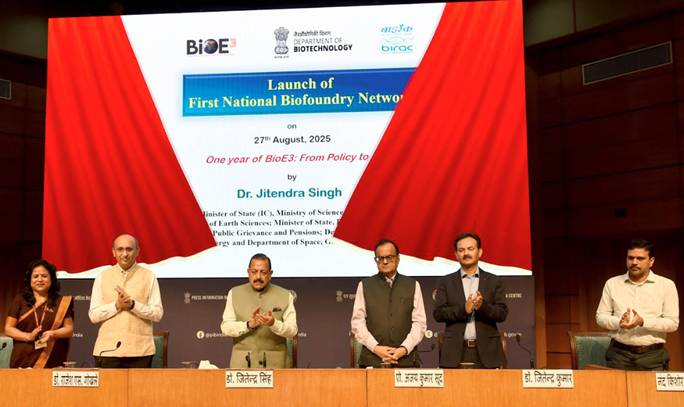India Marks BioE3 Policy Anniversary with Youth Challenge & Biofoundry Network
Prof. Ajay Kumar Sood, Principal Scientific Adviser to the Government of India, described the BioE3 policy as a strategic step towards a green, clean, and prosperous India.

- Country:
- India
Celebrating one year of the BioE3 (Biotechnology for Economy, Environment, and Employment) Policy, Union Minister of Science and Technology Dr. Jitendra Singh unveiled two landmark initiatives — the BioE3 Challenge for Youth and the National Biofoundry Network. These, he said, will make biotechnology a driver of India’s economy, environment, and employment in the coming decade.
“India’s bioeconomy has grown from just $10 billion in 2014 to $165.7 billion in 2024, and we are now targeting $300 billion by 2030,” Dr. Singh said at the event titled One Year of BioE3: From Policy to Action. He stressed that biotechnology has rapidly emerged as one of India’s core growth engines, with tangible achievements in the past year since the BioE3 framework was rolled out.
Major Achievements Under BioE3 Policy
The Minister highlighted key milestones achieved in the first year of implementation:
-
Launch of India’s first Biomanufacturing Institute in Mohali.
-
Establishment of Bio-AI hubs, biomanufacturing hubs, and biofoundries.
-
Over a dozen joint research calls in frontier areas such as cell and gene therapy, climate-smart agriculture, carbon capture, and functional foods, receiving 2,000+ proposals.
-
An MoU with ISRO for collaboration in space biotechnology and biomanufacturing, with three DBT-backed experiments already carried out on the International Space Station by astronaut Group Captain Subhanshu Shukla.
-
A centre-state model partnership initiated with Assam to establish a BioE3 Cell.
-
Global engagement, with 52 Indian missions abroad sharing inputs on BioE3 and working with MEA on follow-up action.
BioE3 Challenge for Youth: “Design Microbes, Molecules & More”
At the heart of the new initiatives is the BioE3 Challenge for Youth, designed to empower grassroots innovators. The challenge, explained by DBT Secretary Dr. Rajesh Gokhale, invites participation from school students (Classes 6–12), university students, researchers, faculty, startups, and Indian nationals.
-
Theme: Design Microbes, Molecules & More.
-
Frequency: Announced on the 1st of every month starting October 2025.
-
Awards: Top 10 winning entries will receive ₹1 lakh cash prize, mentoring, and recognition.
-
Funding: 100 selected awardees will be eligible for up to ₹25 lakh in funding, disbursed via BIRAC, to convert ideas into proof-of-concept solutions.
-
Support: Access to incubation and facilities at BRIC+ institutions across India.
The challenge is anchored in the DESIGN framework:
-
Define real needs
-
Evidence-first solutions
-
Sustainability by design
-
Integration with other technologies
-
Go-to-market strategy
-
Net-positive impact in jobs, inclusion, and equitable access
National Biofoundry Network: A First for India
Alongside the youth challenge, Dr. Singh launched the National Biofoundry Network, linking six institutions to scale up proof-of-concept projects, strengthen indigenous biomanufacturing, and generate high-value employment opportunities.
This network will help accelerate India’s transition from lab-scale innovation to industrial-scale bioeconomy solutions, reducing reliance on imports and promoting Atmanirbhar Bharat in biotechnology.
Fusion of Biology and Emerging Technologies
Prof. Ajay Kumar Sood, Principal Scientific Adviser to the Government of India, described the BioE3 policy as a strategic step towards a green, clean, and prosperous India. He noted that biology is no longer a siloed discipline but is converging with engineering, architecture, AI, and space science, enabling breakthroughs such as:
-
Algae-based carbon capture systems.
-
Biodegradable plastics and organ-on-chip systems.
-
Biophilic urban design for sustainable cities.
-
Space biology experiments to support human spaceflight.
Prof. Sood also highlighted how Artificial General Intelligence (AGI), combined with biotechnology, can create new career opportunities for youth and propel India into the next frontier of bio-innovation.
A Strategic Pillar for Viksit Bharat 2047
Dr. Singh emphasised that the BioE3 framework is designed to strengthen biotechnology as a pillar of India’s growth strategy, ensuring benefits across sectors like agriculture, healthcare, energy, environment, and industry.
He called upon young innovators to embrace the BioE3 Challenge for Youth as an opportunity to create safe, sustainable, and scalable biotech solutions that contribute to India’s long-term vision of Viksit Bharat 2047.
The Road Ahead
Other speakers, including Dr. Alka Sharma, Senior Adviser, DBT and Dr. Jitendra Kumar, MD, BIRAC, outlined the next phase of the policy, which focuses on strengthening research-industry linkages, expanding global partnerships, and boosting entrepreneurship in biotech.
The initiatives announced reflect India’s commitment to positioning biotechnology as a transformative sector for the economy, environment, and employment. With its robust scientific base and growing ecosystem of innovation, India is poised to shape the future of the global bioeconomy.










